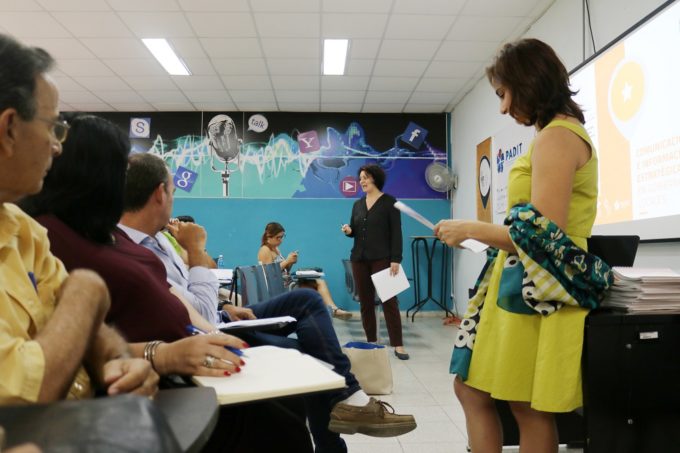 Photo: Darío Gabriel Sánchez
Photo: Darío Gabriel Sánchez
First steps from an on-line government site in Centro Habana
HAVANA – The question is simple: “What’s happening in Centro Habana?” With this friendly beginning, the local government’s website — available for just a few months now — invites citizens to share comments, news, complaints or problems about life in the municipality.
The portal is one of the results of the Enredes project — Information and Communication for the Management of Territorial Development, an initiative of the Faculty of Communication of the University of Havana (FCOM).
The uploading of photographs of the municipality and downloading legal documents, information on procedures, statistics, an inventory of the most relevant community projects, as well as the composition and functioning of the government, are features of the site.
Not only can persons access their political representatives in this manner, but with this tool delegates are held accountable for their work to the voters and must respond to their requests, says Yoisel Lambert Robert, spokesperson for the Municipal Assembly of Popular Power.
For example, each comment or complaint can be classified by sector so that it comes directly to the appropriate authority. Later, the minutes of the Assembly meetings and the municipal budget must also be available.
However, the website does not replace the government’s management systems. “This is just one more outlet,” says Fidel Alejandro Rodríguez Fernández, a professor of Communications, adding, “That is, if a citizen has a complaint, he can do it through the site, or through the Population Service System, which is the official mechanism.”
Centro Habana is the most densely populated municipality in Cuba with serious difficulties in terms of housing, and particular environmental and identity characteristics. “What on the one hand is a challenge, and almost a disadvantage, for the problems that exist in Centro Habana,” says the professor, he adds, “at the same time it is an opportunity to influence where it is most needed, where it can offer a transformative experience.”
Access to the website is not guaranteed with four Wi-Fi zones and three Joven Clubs (Youth Clubs). But its mere existence shows how much more can and should be done with the Internet, and advocates for the growth of connectivity.

One municipality, one country
The guidelines and other programmatic documents foresee a future decentralization of the management of the government and institutions. But to get there you need training, tools, articulation of processes, and actors at different levels, says Raúl Garcés, Dean of the School of Communication.
Like the Centro Habana website, the Communication and Strategic Information Manual on local governments was also presented [last week] at FCOM, sponsored by the Enredes project with the collaboration of the Articulated Platform for Integral Territorial Development (PADIT).
In a simple and pleasant way, texts range from conceptual budgets to tips and solutions on how to arrange a meeting or write a press release, how to take better photos, and the proper use of email. It also gathers good practices of communications from several provinces, and above all it puts in writing important ideas such as:
— “We can sustain an excellent, creative, proactive and committed government, but if people are not are of it, it is almost as if it did not exist.”
— “Communication and transparency are essential in strengthening the image of the people’s power and to combat the myth that municipal assemblies do no work and do not resolve the problems of citizens.”
— “Politics entails large volumes of information and timely, truthful, transparent and verifiable communication.”
Some of the most important points of the project are the methodology in order to identify information needs, training methodology, and the establishment of networks and alliances that strengthen communication processes.
Enredes is not intended to create government sites. The website and Manual are conceptualized as starting points for solutions. They will be useful and replicable depending on the particularities of each location.
In fact, the creation of the Centro Habana portal was preceded by workshops attended by trade unions, self-employed workers, students, the police, and key sectors such as Education, Health and Labor. These meetings generated new proposals and modifications.
“The result is part of a greater effort to integrate the experience accumulated within the classrooms of the Faculty of Communication with the irreplaceable learning and richness that emerged from life situations, with the intent of solving concrete problems of current Cuban society,” writes Garcés in the Manual’s prologue.
There is no socialism without participation and public review. Initiatives like these help our reality appear more like the paradigm.



